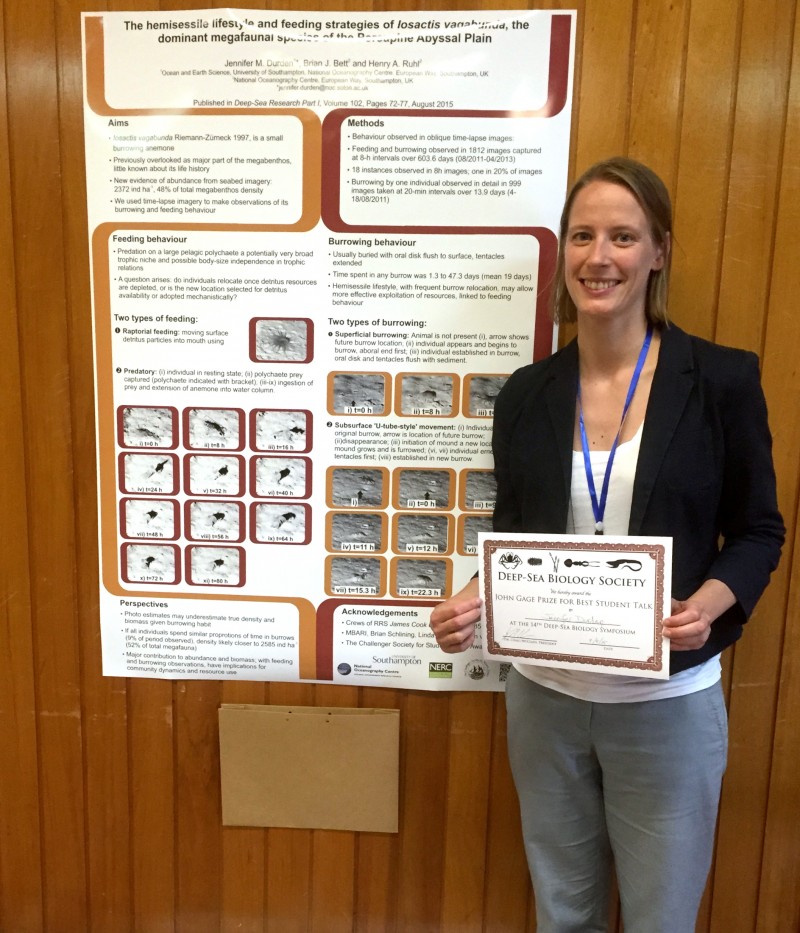Deep-Sea Biology Symposium 2015: Portugual
Jen Durden
NOCS

I would like to thank the Challenger Society for supporting my attendance at the Deep-Sea Biology Symposium 2015 in Aveiro, Portugal through the generous Travel Award. It was a truly memorable and inspiring week!
The highlight of the symposium for me was the opportunity to connect with other deep-sea scientists. My aim was to establish myself within the deep-sea biology community at this symposium. I feel that I met this goal through the dialogs I had with colleagues - past, present, and hopefully future! Over the 5-day symposium, I discussed scientific ideas and learned of new research from leading scientists, and explored opportunities for future work as a post doc.
The presentations of my work were well received. I had many discussions about the two posters (‘The hemisessile lifestyle and feeding strategies of Iosactis vagabunda, the dominant megafaunal species of the Porcupine Abyssal Plain’ and ‘Spatial heterogeneity in the activity of abyssal megafauna’) with researchers in similar fields, some of which generated ideas for future work. My talk entitled ‘The response to food inputs – temporal variation in megabenthic deposit feeding in the abyss ‘ was in the very first slot in the first session of the week, and I was pleased to be asked several questions at the end of my presentation. The icing on the cake of this symposium was being given the John Gage Award for best student talk!
Attendance at this conference has been a vital opportunity to showcase the work I have completed during my PhD, and to learn from deep-sea biologists and ecologists from around the world. I thank the Challenger Society for their support.
Profile:
Jennifer Durden is a final year PhD student in deep-sea ecology at the University of Southampton. Her PhD work has examined spatial and temporal variation in abyssal megabenthic communities, principally using still imagery. The main study site is the Porcupine Abyssal Plain. She has also don research on Station M in the Paicifc, as an intern at the Monterey Bay Aquarium Research Institute in 2014. Before completing an MSc in Oceanography, Jennifer worked as an environmental engineer in Canada, the UK and Egypt.
Tweet:
An awesomely inspiring week in the #deepsea - thanks for your support @challengersoc ! #14DSBS
Latest News
Royal Society Publishing Photography Competition 2025
Please see a message from the Royal Society below:
We are delighted to announce that the 2025 Competition is now open for entries until 15 August for a chance to win £1000! The competition celebrates the power of photography in conveying the wonder of science happening all around us and photographs can be submitted in the categories of: Astronomy, Behaviour, Earth Science and Climatology, Ecology and Environmental Science, and Microimaging.
The competition is free to enter and open to anyone studying or working in science at graduate level or above. Category winners will receive a one-year membership to the Royal Photographic Society and the overall winner will receive a grand prize of £1,000. Find out more: https://bit.ly/RSPphotocomp
October 2025 MEDIN Workshop: Marine Data Management, Governance and the MEDIN toolset
The Marine Environmental Data and Information Network (MEDIN) are pleased to announce that registration is now open for the next occurrence of our popular free online training workshop: ‘Marine Data Management, Governance and the MEDIN toolset’ on the 13th – 17th October 2025 on OceanTeacher Global Academy.
Marine Data Management, Governance and the MEDIN toolset
The Marine Environmental Data and Information Network (MEDIN) and OceanWise are delighted to invite you to attend our popular free online training workshop: ‘Marine Data Management, Governance and the MEDIN toolset’ on the 19th – 23rd of May 2025.
